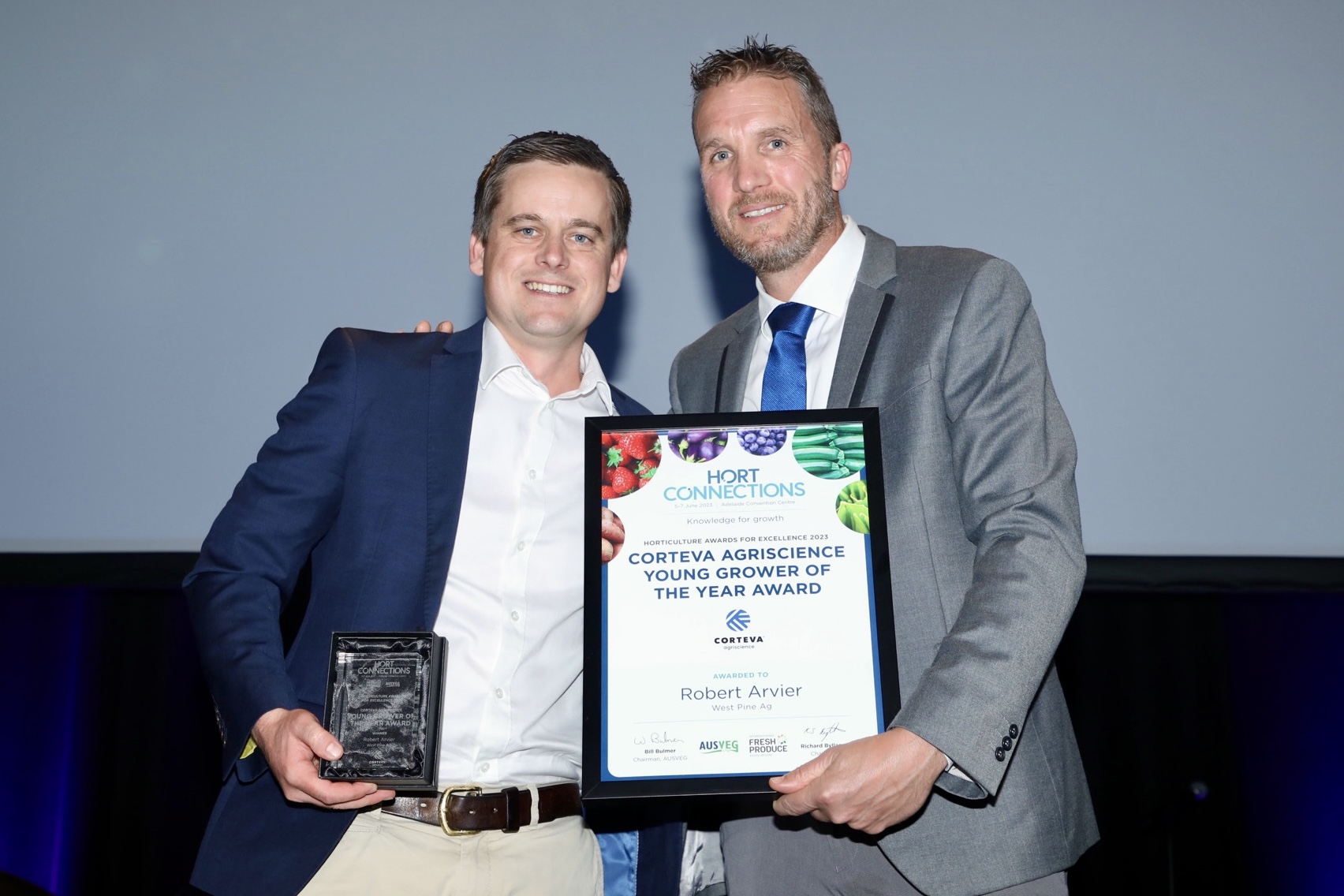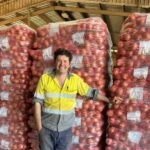
Lean principles drive efficiencies in agriculture
28 September 2023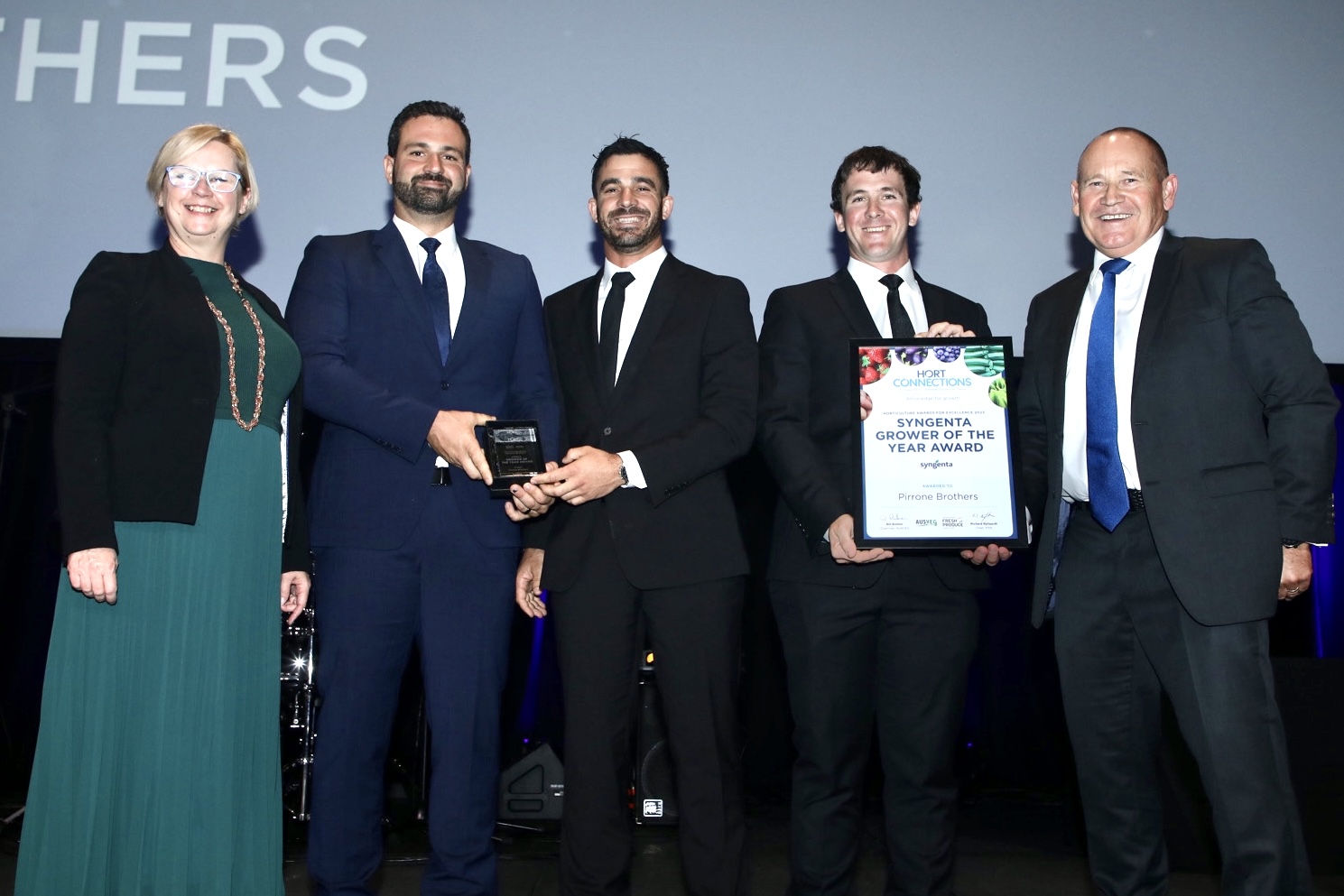
Hort Connections 2023 Grower of the Year
28 September 2023A focus on people, planet and production, West Pine Ag is primarily an agribusiness focused on high-efficiency, low-impact food and energy production and is led by the 2023 Corteva Agriscience Young Grower of the Year, Robert Arvier.
An entrepreneurial first-generation farmer, Robert Arvier was recognised for his innovation, commitment to excellence and sustainability and as a future leader for the industry.
Robert’s business, West Pine Ag based in Penguin, on the north west coast of Tasmania is a diverse mixture of vegetable and crop production, consultancy and agrifood projects spanning 250ha across Tasmania and Victoria.
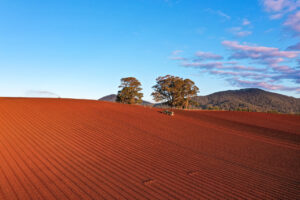 Born and raised in the Penguin region, Rob had always shown a keen interest in agriculture and completed a Bachelor degree in Agricultural Science at University of Tasmania, and a Masters degree in Agribusiness from University of Melbourne. In 2017 Rob was awarded a Nuffield scholarship focussed on the economic feasibility of sugar beet in southeast Australia.
Born and raised in the Penguin region, Rob had always shown a keen interest in agriculture and completed a Bachelor degree in Agricultural Science at University of Tasmania, and a Masters degree in Agribusiness from University of Melbourne. In 2017 Rob was awarded a Nuffield scholarship focussed on the economic feasibility of sugar beet in southeast Australia.
A tenure with global agribusiness Lesaffre, taught Rob valuable business strategy and environmental management skills that have been integral to the success of West Pine Ag that was established in 2018.
As a farming enterprise start-up Rob has been conscious that West Pine Ag had to be economically viable while mindful of risk in climate and social licence terms from the outset.
“Everything aspect of our business must be commercially viable and attractive to first tier lenders. If that debt is not serviceable, we have a problem, just like any other business, so it is vital to manage our risks.
“We are now finding that the markets and processes we work with recognise the need for shared risk modelling when it comes to crop production. We simply can’t take the hit of full crop or seasonal failure. Diversification of the business has been absolutely crucial.”
Of the businesses incorporated into West Pine Ag, two are focused on alternative energy sources and utilising molasses extracts.
These common theme of these project objectives is to utilise byproducts of agrifood processes for further applications. Straw stubble that would otherwise be burned in the paddock was pelletised and used as a biofuel for two Victorian hospitals.
The molasses extract will be utilised as an ingredient into stockfeed and fertiliser applications. Rob sees these projects as a way to increase value to farmers where previously those resources previously went unrecognised.
On farm, the Penguin property produces a range of vegetables – potatoes, onions, carrots and brassicas.
In a bid to reduce carbon emissions, Rob and the West Pine team are working on accounting methods to measure biodiversity metrics, soil moisture and local weather patterns to gain a baseline from which to improve their farming practices.
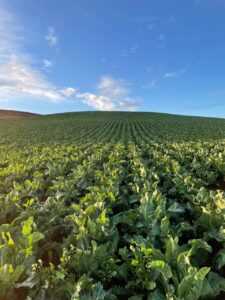 “Biodiversity is a tricky one and we are collaborating with people to understand the DNA of the soils and water resources so we can change our practices to do it better. We have also participated in a project lead by AgLogic and the Tasmanian Drought Resilience Hub to establish a weather station network. By putting those learnings into practice for both vegetables and crops we are moving away from the shovel and using data from what the soil is telling us.”
“Biodiversity is a tricky one and we are collaborating with people to understand the DNA of the soils and water resources so we can change our practices to do it better. We have also participated in a project lead by AgLogic and the Tasmanian Drought Resilience Hub to establish a weather station network. By putting those learnings into practice for both vegetables and crops we are moving away from the shovel and using data from what the soil is telling us.”
Young Grower award is a team effort
“We were really excited to have been part of the program, and surprised to have won, given the field of incredibly talented people that were nominated this year, and what they are doing.”
“From my side I think everything I’ve done from a business point of view is in collaboration. That award belongs not only to me, but also the entire group of staff across the businesses who have made that happen.”
Rob credits the core group of 12 staff at West Pine Ag with pulling together to achieve such an outcome, but also acknowledged that without the support of other businesses and family, it could well have been different.
“Whilst I like to think I’ve given back to all of those people, as is the nature of collaboration, without their support and their belief that I would succeed, I wouldn’t be here. Having those relationships early on were really, really critical to succeeding.”
Rob’s advice to the next young growers in horticulture is to foster collaboration, a formal education and practical experience. An understanding of the practical aspects of farming, combined with business management skills will enable future generations to create a successful farming enterprise.
Image: L-R Nick Koch, Corteva Agriscience and Robert Arvier. Courtesy Andrew Beveridge
Hear our interview with Rob Arvier on Vegalogue

